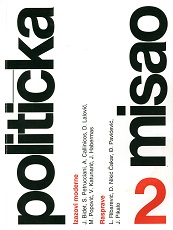Sistemska teorija masovnih medija
Systemic Theory of Mass Media
Author(s): Tomo JantolSubject(s): Politics / Political Sciences
Published by: Fakultet političkih znanosti u Zagrebu
Keywords: system; environment; autopoiesis; function; observed reality; real reality
Summary/Abstract: Mass media produce various communicational products in the form of messages coded in the symbolic language of writing, sound or image, which they distribute through the open public space for unknown users. Unlike the traditional theories, which directed their attention above all to the social effects of media products, the systemic theory inquires into the very process of their production, deeming that precisely the latter is the real reality of mass media: the factual operations which are performed systemically, through application of the binary code of information/non-information, and according to the internal rules of its structure. The real reality, however, is inaccessible to the observer. Consequently, he can gain knowledge of it only in such a way as to construct from the forms in which it appears to him an observed reality as his own perception thereof. The systemic theory suggests that its construction of mass media reality is most congruous with their real reality. Keeping in mind that each observer performs his construction of reality of the thing observed in accordance with his own knowledge and understanding, the author asks himself: where is the evidence of the trustworthiness of such constructions?
Journal: Politička Misao
- Issue Year: XLVIII/2011
- Issue No: 02
- Page Range: 143-158
- Page Count: 16
- Language: Croatian

